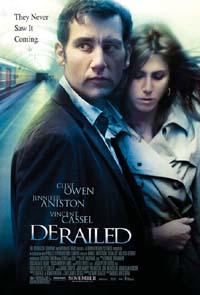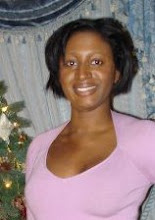Review: Derailed

Today, I went to see Derailed featuring Jennifer Aniston and Clive Owen. I was very curious seeing that I like to see actors break out of their usual niches and venture into something different. (Think Kate Hudson's The Skeleton Key ) So I was curious to see Jennifer Anniston in a suspense role. Likewise, I thought the best thing about last year's Closer was Clive Owen so I wanted to see him on screen again. In essence, I was curious about a lot of things and while I must say that I didn't hate the film, it left a lot to be desired in many ways.
As soon as I heard of the plot for Derailed , I thought of a 1987 movie entitled Hands of a Stranger starring Armand Assante and Beverly D'Angelo. The movie is essentially about a woman named Mary who is married to a cop (that's Assante's character) who doesn't pay enough attention to her and in many ways takes her for granted. D'Angelo then begins to gravitate to her son's basketball coach and the two decide to have an affair. They visit a cheap, seedy motel and are about to have sex when D'Angelo changes her mind. She feels guilty about cheating on her husband, especially since te man in question is her son's coach. She gets up to leave and as she opens the door, a man with a gun forces his way into the room. He robs them both, ties them both up and rapes Mary. Mary feels so guilty about what she was doing in the room in the first place but knows that she has to say something to her husband, especially since her wedding ring was stolen. So she concocts a story about being abducted on the street. Assante's character Joe doesn't buy the story and begins to tape his wife's conversations and follow her. Soon, the robber/rapist begins to blackmail the coach and Mary and this is when Joe begins to uncover the truth of what really happened. He becomes obsessed with finding his wife's rapist. When Joe finds him and is tormented between killing him or turning him in, the rapist says, "Sir. I mean no offense, but shouldn't it be your wife you shoot instead of me?...I can see, sir, that there is a part of you that is conflicted over killing me. It is that part of your character I would like to address".
Derailed is much like this though not exactly. Clive Owen is Charles Christopher Shyne, a married business executive who leads a pleasant albeit predictable life in the suburbs of Chicago. His wife Deanna (Melissa George) and he have lost the passion in their lives as their daughter Amy (Addison Timlin) remarks that they don't kiss in the mornings anymore. In fact their singular purpose is to qualify for an expensive piece of equipment for their Type 1 diabetic daughter, who seems to teeter on the cusp of death, her skin the color of plaster and her body seeming quite feeble.
Charles takes the train every morning, predictable and soon we see him meet the lovely Lucinda (Jennifer Aniston). She's perky, witty, and is a tad mysterious. She brightens up Charles's day and lightens the anxiety about his daughter's illness that burdens him. Little does he know that its this meeting that will begin his steady descent. Though he knows he shouldn't, he makes a lunch date with Lucinda and the attraction is definite. Charles is succumbed by his anxiety about his daughter and his vapid marriage and Lucinda is consumed by a vapid marriage as well. They decide to have sex and settle on a cheap motel ---$49 dollars for a room. They enter the room and begin to make out when an armed man, Philip LaRoche (played by the wonderful Vincent Cassel) forces his way in. He robs them, beats Charles, and rapes Lucinda.
The problems just keep coming as LaRoche begins to blackmail Charles for more and more money, hence conflict ensues. At the beginning of the film, it seems as if Charles is an intelligent man but clearly through the progression of this film, its not the case. He makes the most ludicrous decisions during the course of the film. RZA and Xzibit make appearances in the film as well. As actors, they were average --- not horrible but surely not a delight. The representation of Blackness was very stereotypical of Hollywood. You have Winston (RZA), the ex-con mailboy at Charles's job, Xzibit, one of LaRoche's cronies, and Giancarlo Esposito, the cop who espouses to find the truth. Its no shock that when Charles needs help with the gangsters, he turns to RZA, asking him about his prison days and seeking an education on brutality, something that Charles up until now has had no prior experience with. Winston asserts, "Prison's like walking a tightrope...When your back's up to the wall, you gotta do what you gotta do.", after admitting to killing a man.
Both RZA and Xzibit's roles in this film are to reinforce the brutality of their white counterparts either directly or indirectly through their own criminality. RZA educates Charles on brutality and even gives him a shank he made while in prison. Xzibit assists LaRoche in his brutal scheme, backing up LaRoche's own sadism. Giancarlo Esposito represents the Black male "goodness giver". A man of law and justice, Esposito is a moral center of the film. Thus, Blackness is categorized into two preidctable platforms that are not nearly nuanced enough: all three characters are violent (even though Espositio is a cop, cops have to get violent sometimes). Esposito is "good violent", RZA is "circumstantially violent" and Xzibit is "wickedly violent".
The film is entertainment. Its not a horrible film by far by its not excellent. The conflict and decisions of the main character, Charles, could have been explored more and Aniston's Lucinda could have been more fleshed out and more of a departure from her cutsy film/TV characters.
edacious -- adj. : Given to eating; voracious; devouring
"Illusion is the first of all pleasures"
--- Oscar Wilde


0 Comments:
Enregistrer un commentaire
<< Home